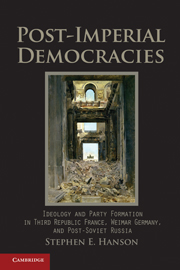 Post-Imperial Democracies
Post-Imperial Democracies Book contents
- Frontmatter
- Contents
- Acknowledgments
- Preface
- Post-Imperial Democracies
- PART ONE CONCEPTUAL AND THEORETICAL ISSUES
- PART TWO CASE STUDIES
- 4 The Founding of the French Third Republic
- 5 The Rise and Fall of the Weimar Republic
- 6 Post-Soviet Russia
- 7 Conclusion: Bringing Ideology Back In
- Index
- Cambridge Studies in Comparative Politics
- References
7 - Conclusion: Bringing Ideology Back In
Published online by Cambridge University Press: 05 June 2012
- Frontmatter
- Contents
- Acknowledgments
- Preface
- Post-Imperial Democracies
- PART ONE CONCEPTUAL AND THEORETICAL ISSUES
- PART TWO CASE STUDIES
- 4 The Founding of the French Third Republic
- 5 The Rise and Fall of the Weimar Republic
- 6 Post-Soviet Russia
- 7 Conclusion: Bringing Ideology Back In
- Index
- Cambridge Studies in Comparative Politics
- References
Summary
The evidence presented in this book suggests that the role of ideology as a causal variable in the early stages of party formation has been seriously underestimated by political scientists to date. Out of sixteen political parties examined, fifteen fit the central hypothesis advanced here: namely, that under conditions of intense institutional and social uncertainty, parties must have ideologies – that is, clear and consistent definitions of the principles governing membership in their preferred polity – to succeed in overcoming the collective action problems involved in creating national organizations of party activists, while nonideological parties fail to do so as a result of instrumentally rational free riding among party members. This hypothesis explains the otherwise puzzling success of the initially marginalized republicans and legitimists in France after the defeat at Sedan, and the concomitant organizational failure of the comparatively well-established Orléanists and Bonapartists. It explains the relative strength and endurance of the Social Democratic Party and monarchist German National People's Party in the 1920s, in comparison with the splintering of the German People's Party, the German Democratic Party, and the Independent Social Democrats; similarly, it explains the emergence of the Nazis and Communists in Weimar Germany – originally on the very fringes of political life – as the two major contenders for power in the late Weimar Period. Finally, our central hypothesis is borne out in post-Soviet Russia, where the relatively ideological Communist Party of the Russian Federation and Liberal Democratic Party of Russia managed to sustain their party organizations throughout the first sixteen years of the Russian Federation, while less ideologically consistent liberal parties and “parties of power” fractured – at least until the authoritarian regime of Vladimir Putin decided to build a pliable pro-Kremlin party from the top down (see Table 7.1).
- Type
- Chapter
- Information
- Post-Imperial DemocraciesIdeology and Party Formation in Third Republic France, Weimar Germany, and Post-Soviet Russia, pp. 237 - 254Publisher: Cambridge University PressPrint publication year: 2010


